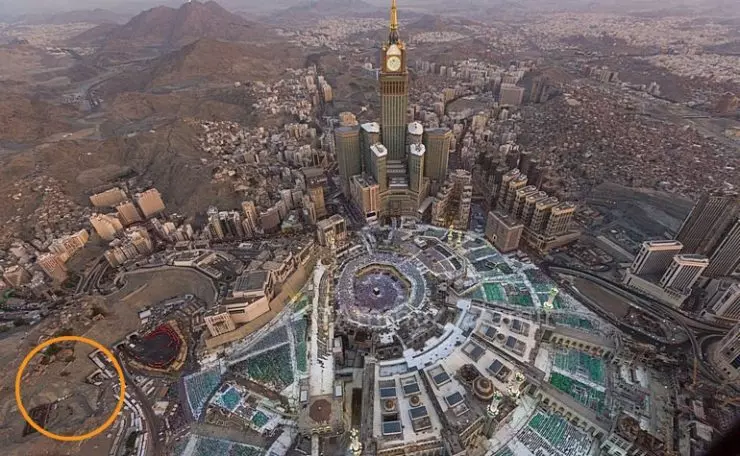
Boycott of Bani Hashim
The spread of Islam among the tribes further aggravated the resentment of the Quraysh.
They came together and decided to draw up a decree ostracizing Bani Hashim and Bani ‘Abdul Muttalib.
It was decided that nobody should marry the women of these two clans nor give their women to them in marriage; neither should they buy from nor sell to them.
Having solemnly agreed to these points, the agreement was put into writing and the parchment was hung in the Ka’bah in order to give it a religious sanction thereby making it mandatory for all.
Bani Hashim IN THE VALLEY OF SH’EB ABI TALIB
Bani Hashim and Bani Abdul Muttalib joined Abu Talib after the boycott was enforced
and withdrew to a narrow glen or wadi known as Sh’eb Abi Talib.
It was the seventh year of the Prophet’s (r) mission. Abu Lahab Ibn ‘Abdul Muttalib, however, decided to join with the Quraysh, leaving his kith and kin covered by the ban.
Weeks and months had passed, and the people of Hashim lived in misery and hunger.
The ban was so rigorously enforced that the Prophet’s (r) clan was reduced to eating acacia
leaves and the cries of hungry children reverberated all over the valley.
The caravans passed peacefully through the streets of Makkah but the Quraysh told the merchants not to buy from or sell anything to the two forsaken clans. This resulted to the prices being pegged so high that it was extremely impossible for the beleaguered people to purchase even their basic necessities.
The decree of proscription lasted for three years and for the same number of years Bani Hashim and Bani ‘Abdul Muttalib lived in exile and endured the hardships of a blockade.
But not all Quraysh people were utterly humiliated and deprived.
Those of them who were good-natured and kindhearted occasionally supplied food secretly to those who are in exile.
However, the Prophet (r) never ceased preaching the message he had brought
to his own people and even towards others, whenever he got the opportunity.
Bani Hashim on their part endured every trouble with exemplary patience and fortitude.
ANNULMENT OF THE DECREE

The pitiable condition of the exiles gave rise to a feeling of resentment against the ban confronting the gracious and genial sons of the desert.
Hisham Ibn ‘Amr Ibn Rabi’a took the initiative to end the boycott.
He was amiable and kindhearted, as well as highly esteemed by the Quraysh.
He approached some other considerate and well-disposed persons and put them to shame for allowing tyranny to linger on. At last, Hisham, supported by four other persons agreed to stand together till the decree of boycott was cancelled.
Then, when the Quraysh had assembled in the sanctuary, Zuhayr whose mother ‘Atika was daughter of ‘Abdul Muttalib, cried out to the people,
“O ye people of Makkah, shall we eat and drink while Bani Hashim should die of hunger, unable even to buy or sell? By God I will not take rest until this cruel and unjust decree is torn into pieces.”
Abu Jahl tried to intervene but found everybody against him. Mut’im Ibn ‘Adiy
then went up to tear the document into pieces but discovered that with the exception of the words
“In Your Name, O Allah”
the rest of the document had already been eaten up by white ants. The Prophet (r) had already told his uncle, Abu Talib, that God has given the white ants power over the document.
The blighted document was, however,
taken out and thrown away and thus ended the boycott and everything that was written on it.
Lessons to be Learned from this Period of History:

Muhammed was neither seeking Prophethood nor was he dreaming about it.
Allah used to inspire his heart to seek seclusion in order to worship and purify his soul, and to prepare his spirit to carry out the duties of the message.
If Allah’s Messenger was seeking for it, he would not have been frightened when it came to him. When Muhammed came from the mountain in order to ask Khadijah (May Allah be pleased with her) about the incident, which took place in the cave, he was not assured that he was a Messenger until he saw Gabriel and heard him say,
“O Muhammed, you are Allah’s Messenger and I am Gabriel.”
Waraqah ibn Naufal and Khadijah (May Allah be pleased with her) assured him that what he saw in the cave was the same revelation as that which came to Moses.
Allah’s Messenger surprised the Arabs with something unfamiliar
,thus they objected to it vehemently.
Their primary concern was to put an end to the Prophet (r) and his companions. This is a historical refutation to those who claim that Muhammed was a preacher of nationalism and that he represented the hopes and aspirations of the Arabs at that time.
This is a ridiculous claim because the historical events belie this notion, as we have witnessed. Those who made such remarks were simply biased in their nationalistic views and this led them to claim that Islam was a matter that originated from the Arabs and their
thought. This is a clear denial of the prophecy of the Messenger and an insult to the message of Islam.
The phrase, which the Prophet (r) uttered to his uncle and his rejection of the offer of the
Quraysh
,is evidence that the Prophet (r) was truthful in his proclamation of Allah’s message and his desire to guide the people to the straight path.
In the same way, the caller must be persistent and determined with their call no matter how gravely the wrongdoers oppose them.
They must turn away from their temptations of honor and positions because the adversities disputing the path of truth should bring comfort to their consciences and hearts.
Furthermore, Allah’s pleasure and His Paradise should be more valuable to them than the entire honor, positions, and wealth combined in this world.
The order of the Messenger (r) to his companions (May Allah be pleased with them) concerning the first and second emigrations to Christian Abyssinia is an indication that the ties among religious people, even if their religions are different, are stronger and more reliable than their attachment those bereft of religious sensibilities.
The revealed religions, in their authentic and agreed upon sources and principles, adhere to the greater social objectives in the same way that they are in agreement concerning belief in Allah, His Messengers and the Last Day.
This makes the relation between them stronger than any bond based on family
ties, blood or country with those who have no God-consciousness.
for prophets stories visit https://sunofislam.com/prophetsofgod/
for scientific miracles articles visit www.sunofislam.com
